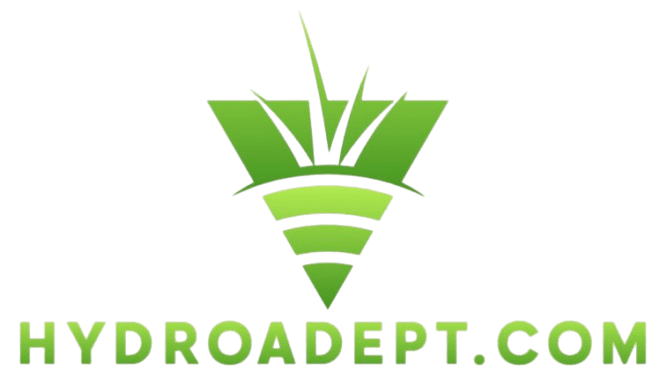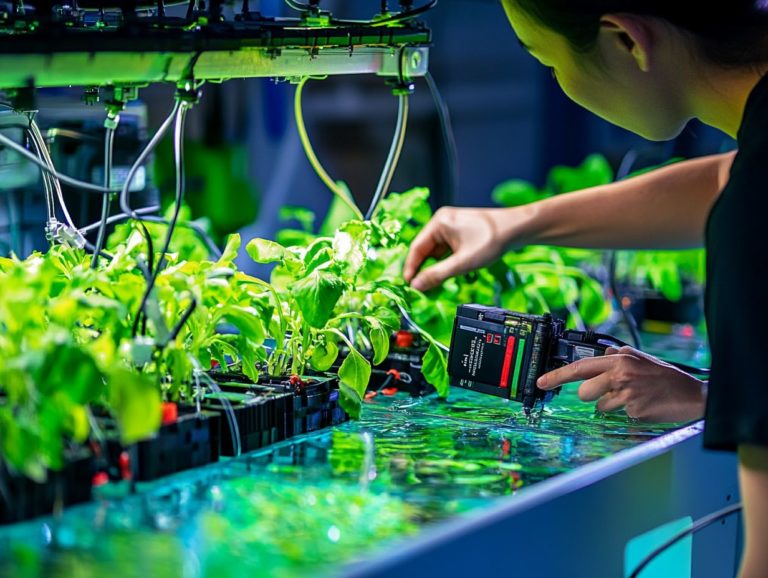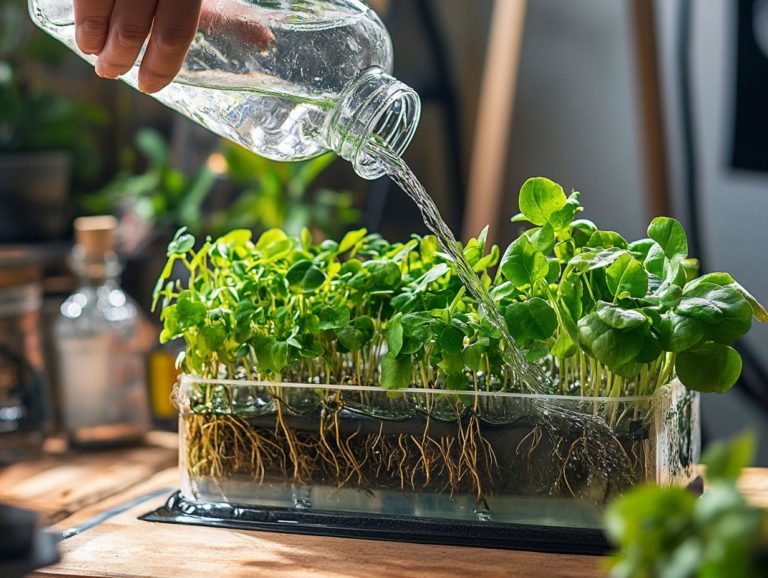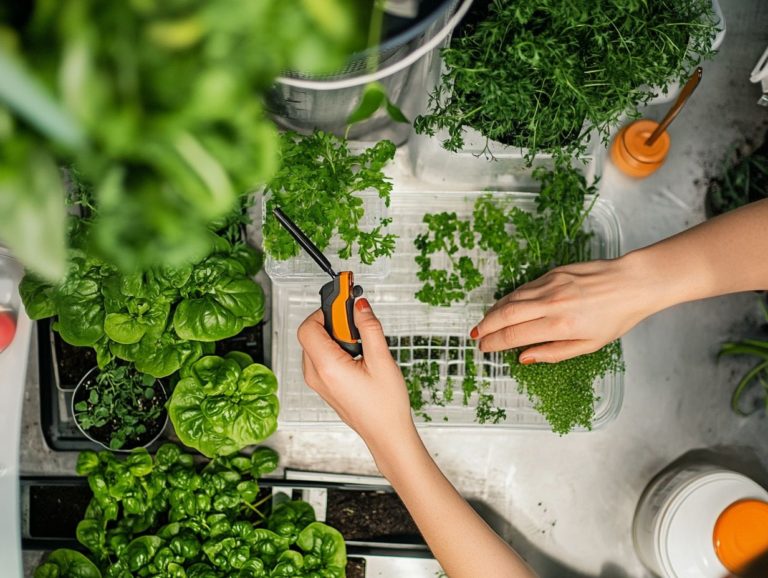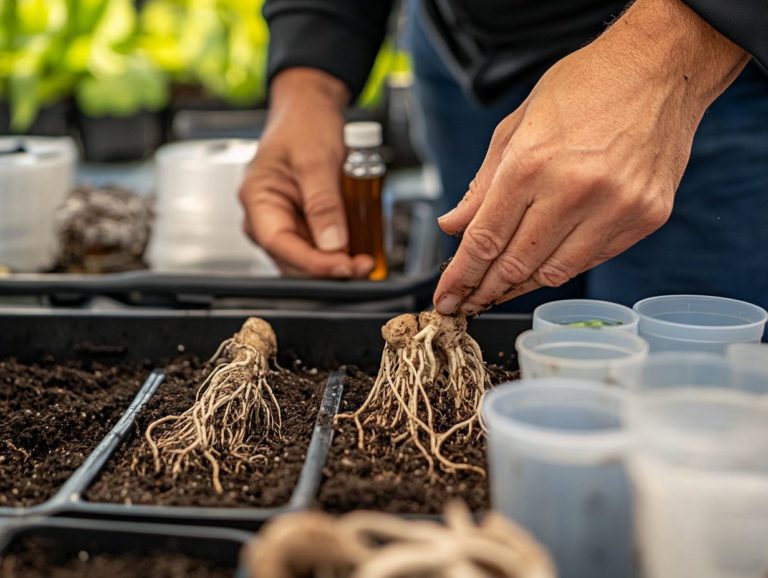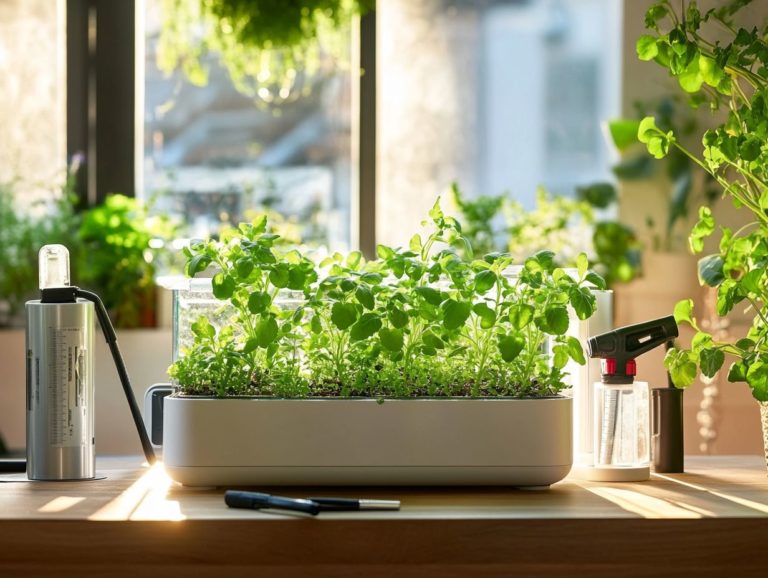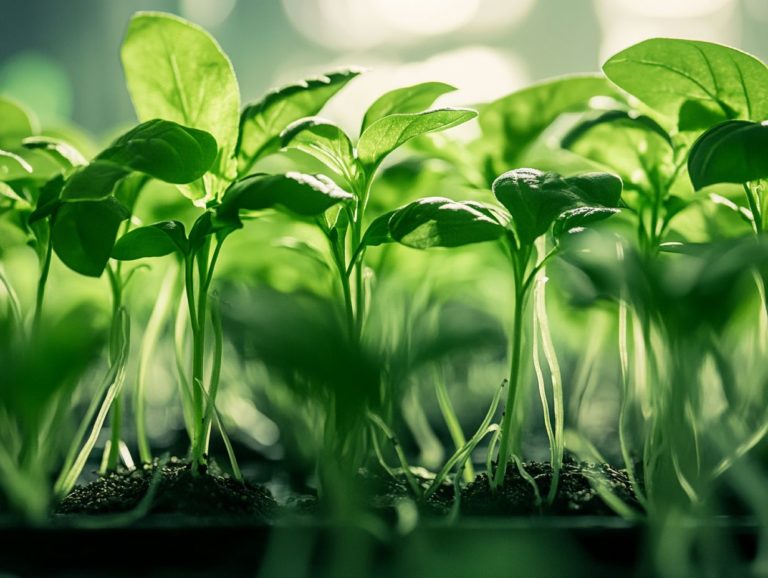Maintaining Water Quality in Hydroponic Systems
Hydroponics is transforming the way you cultivate plants, presenting a soil-less alternative that enhances both efficiency and yield, especially in advanced agricultural practices.
One of the most crucial elements in a successful hydroponics system is water quality. This article delves into the vital role water plays in plant growth and the various factors that can impact its quality, including water temperature and hardness. We will explore practical methods for testing and maintaining it.
By understanding pH levels and utilizing tools like a pH meter and total dissolved solids meters, and troubleshooting common issues, you ll uncover best practices that can lead to flourishing plants in your hydroponic garden.
Whether you re an experienced grower or just embarking on your hydroponic farming adventure, this guide offers valuable insights to elevate your journey.
Contents
- Key Takeaways:
- Importance of Water Quality in Hydroponic Systems
- Factors Affecting Water Quality
- Testing and Monitoring Water Quality
- Maintaining Water Quality in Hydroponic Systems
- Troubleshooting Water Quality Issues
- Frequently Asked Questions
- What is hydroponics and why is maintaining water quality important in this system?
- What are the common water quality issues in hydroponic systems?
- How often should the water in a hydroponic system be changed?
- What is the best way to maintain proper pH levels in a hydroponic system?
- How can I prevent algae growth in my hydroponic system?
- What are the benefits of using reverse osmosis water in a hydroponic system?
Key Takeaways:
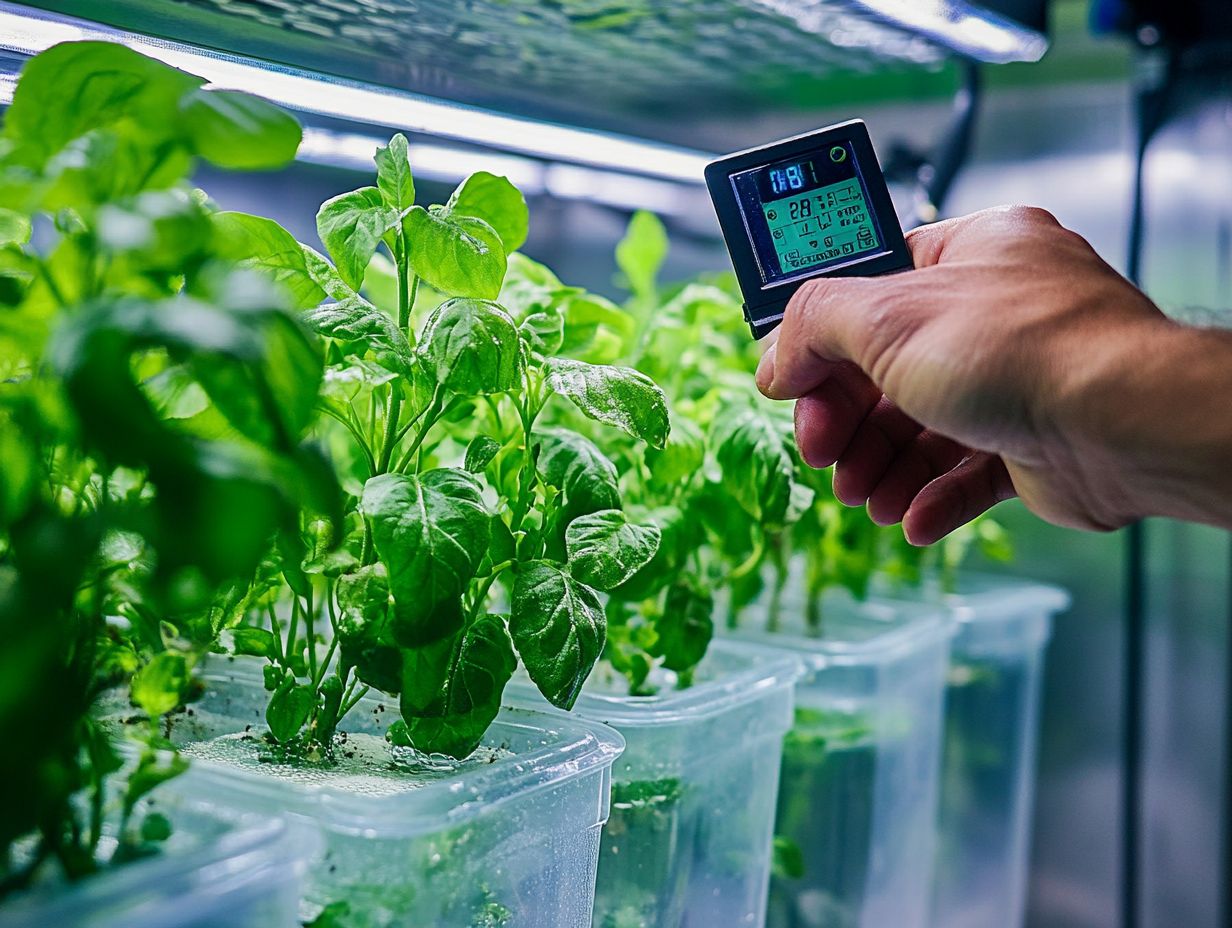
- Maintain proper pH levels and nutrient balance in hydroponic systems to promote optimal plant growth and yield.
- Regularly test and monitor water quality to identify and address any potential issues, such as contaminants or pests, by implementing effective water filtration systems.
- Follow best practices and strategies for maintaining water quality in hydroponic systems to ensure a healthy and thriving growing environment for plants.
What is Hydroponics?
Hydroponics stands as a groundbreaking agricultural practice that gives you the power to cultivate plants in a solution rich in nutrients without the need for soil. This method streamlines plant growth and enhances crop yield, making it an efficient choice for those looking to maximize their agricultural efforts.
With various advanced growing techniques at your disposal, you can successfully nurture popular hydroponic crops like lettuce and tomatoes. By employing a hydroponics system, you can optimize nutrient uptake and effectively manage environmental conditions.
Originating from ancient civilizations, the concept of soil-less cultivation has transformed into a sophisticated science that harnesses both technology and botanical knowledge. At its core, hydroponics focuses on delivering essential nutrients, water, and minerals directly to the roots, resulting in faster growth cycles and more efficient resource usage.
Unlike traditional agricultural methods that often depend on vast land areas and vulnerable soil conditions, hydroponics significantly reduces the risks of pests and diseases, leading to healthier plants. Controlling factors like pH and oxygen levels helps your crops grow better, making this method not only sustainable but also exceptionally productive in both urban and rural environments.
Importance of Water Quality in Hydroponic Systems
Water quality is crucial in hydroponic systems, directly impacting plant health, nutrient management, and the overall success of your crops, especially concerning water supply from municipal sources.
Ensure that your water sources are pristine and implement effective water management techniques, like reverse osmosis, which filters out impurities from water. This enhances nutrient availability and is essential for understanding the basics of hydroponic systems, creating ideal growth conditions for your hydroponic plants.
Effects on Plant Growth and Yield
The quality of water you use in hydroponics plays a pivotal role in both plant growth and yield. It influences crucial factors such as nutrient uptake, dissolved oxygen levels, and the likelihood of nutrient deficiencies.
By ensuring high water quality, you create optimal conditions for your plants, paving the way for robust growth and maximum crop yield.
When assessing water quality, parameters like dissolved oxygen are essential for maintaining the health of the root system, which directly affects your plants’ ability to absorb vital nutrients.
It’s crucial to maintain balanced nutrient ratios; any imbalances can lead to nutrient competition, resulting in deficiencies that stifle crop development. Effective nutrient management and diligent monitoring of water chemistry are key to achieving vibrant plant health and maximizing agricultural productivity.
By paying close attention to these details, you can cultivate a resilient plant ecosystem that thrives and delivers bountiful harvests.
Start your hydroponic adventure now and watch your garden flourish!
Factors Affecting Water Quality
Several factors influence water quality in hydroponic systems, such as pH levels, total dissolved solids, including hard water, electrical conductivity, and the presence of contaminants.
Understanding these water chemistry parameters is critical for maintaining optimal conditions for plant growth. It also helps address challenges related to water hardness and the availability of nutrients in the solution.
pH Levels and Nutrient Balance
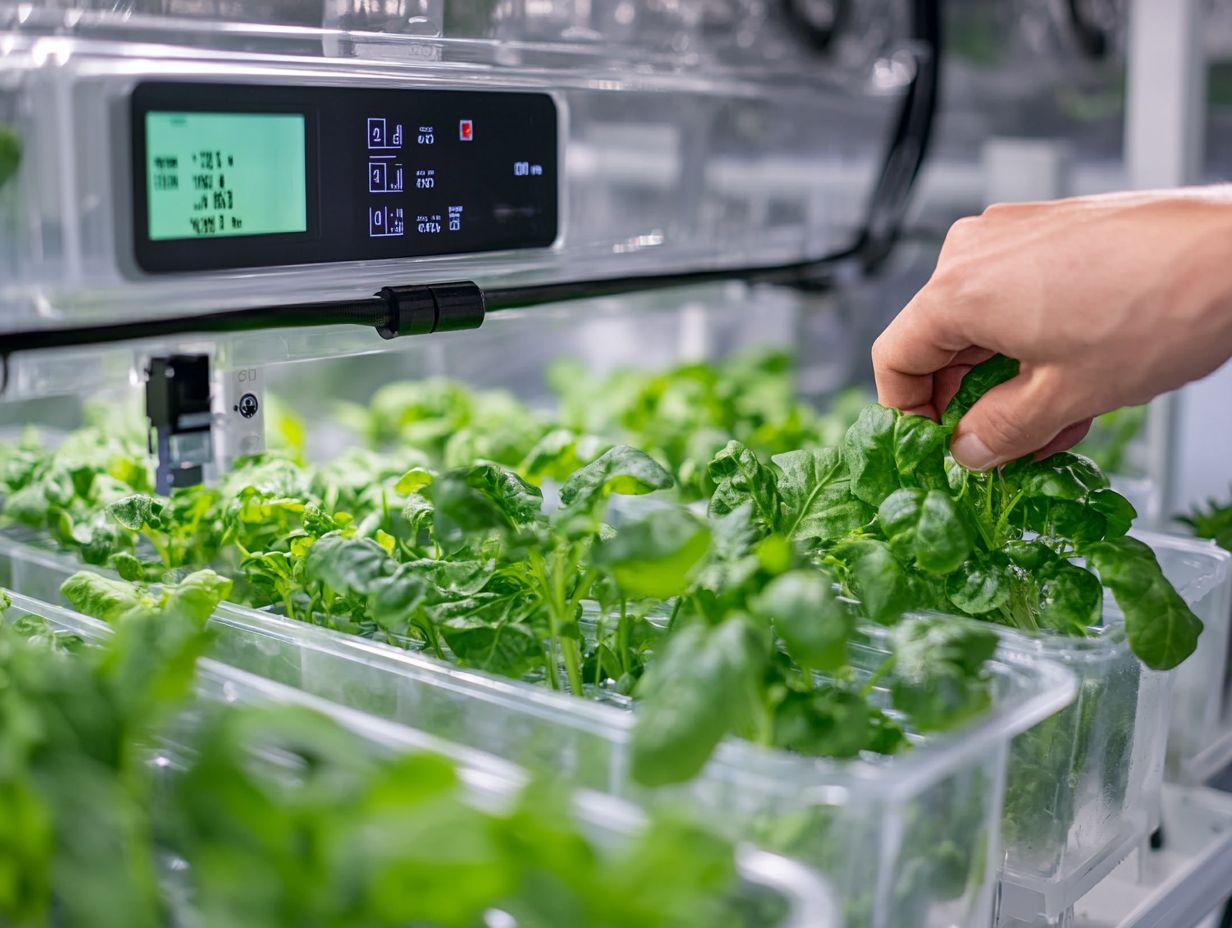
Maintaining the correct pH levels in hydroponic systems is essential for achieving a harmonious nutrient balance. This balance directly impacts the availability of nutrients crucial for plant growth.
Regularly testing and adjusting pH levels are key components of effective water quality management. Staying within the right pH range optimizes nutrient uptake and significantly enhances plant health and growth rates.
The availability of different nutrients fluctuates with pH levels. For example, essential elements like iron and manganese are best absorbed at specific pH ranges.
Calibrating your measurements with reliable calibration solutions is a best practice. By consistently monitoring and adjusting pH levels, you can prevent nutrient deficiencies and toxicities. This creates healthier plants and ultimately leads to higher yields.
Contaminants and Pests
Contaminants and pests can significantly threaten water quality in hydroponic systems. This jeopardizes plant health and crop yield.
To protect your hydroponic crops, it’s crucial to implement effective water filtration systems and robust pest management strategies.
Harmful pathogens, chemical runoff, and invasive species can disrupt the delicate balance necessary for optimal plant growth. When pests invade, they can compromise the nutrient solutions vital for your crops.
Farmers often use methods to control pests that prioritize biological control and eco-friendly pesticides. They also adopt water conservation practices to enhance system efficiency. By addressing these concerns comprehensively, you can cultivate healthier crops, improve yield quality, and contribute to a more sustainable approach to agriculture.
Testing and Monitoring Water Quality
Regular testing and monitoring of water quality are critical in hydroponic systems. This ensures your crops thrive under optimal conditions.
Using tools like pH meters, total dissolved solids (TDS) meters, and electrical conductivity (EC) sensors empowers you to assess and manage water quality with precision. This ensures a stable growing environment.
Methods for Testing and Monitoring
You have several effective options for testing and monitoring water quality in hydroponic systems. Tools like pH meters, TDS meters, and EC sensors offer valuable insights into nutrient balance and overall water quality.
A pH meter allows you to accurately assess the acidity or alkalinity of your water. This optimization is crucial for nutrient uptake and plant vitality.
TDS meters measure the concentration of dissolved particles. This helps you determine if nutrient levels are too high or too low.
Meanwhile, EC sensors evaluate water conductivity, correlating it to the concentration of ions and providing further guidance on nutrient availability.
Regularly using these monitoring techniques guarantees your plants receive the right materials. It also creates a stable growing environment vital for the success of your hydroponic endeavors.
Maintaining Water Quality in Hydroponic Systems
To keep water quality high in hydroponic systems, adopt best practices. Regularly monitor water parameters, use efficient irrigation systems, and embrace water conservation techniques.
This approach enhances plant health and maximizes crop yield, setting the stage for optimal growth and success.
Best Practices and Strategies
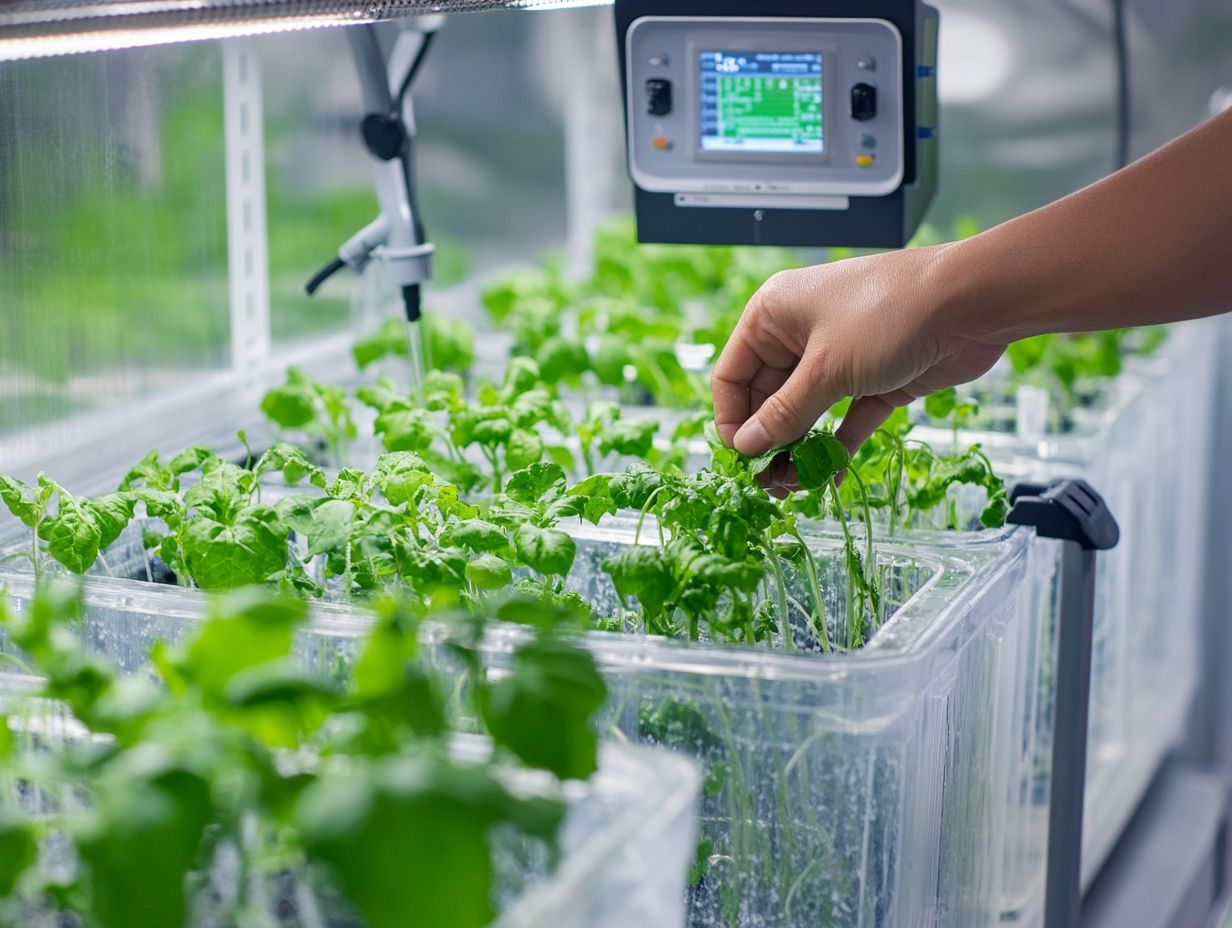
Implementing best practices is crucial for maintaining water quality. This helps prevent nutrient deficiencies and ensures consistent crop development.
To achieve your goals, adopt key practices focused on nutrient management. Regularly test water for pH and conductivity to keep your nutrient solution balanced.
Integrating advanced irrigation systems, like drip irrigation, allows precise water application, minimizing waste while promoting root health.
Using rainwater collection systems is another smart move. It conserves resources and provides a variety of nutrients, contributing to robust plant growth.
Employing these strategies maximizes resource efficiency, leading to healthier crops and fostering a sustainable agricultural environment.
Troubleshooting Water Quality Issues
Troubleshooting water quality issues in your hydroponic system is essential. By pinpointing common problems like nutrient deficiencies or contaminants, you can effectively tackle these challenges.
Identifying and Solving Problems
Identifying and resolving water quality issues is vital for your hydroponic system. Problems like nutrient deficiencies can significantly impact plant growth and yield.
Employ effective testing methods, such as using a pH meter and monitoring dissolved oxygen levels, to pinpoint issues accurately.
Regularly assess water quality by testing pH levels, electrical conductivity, and nutrient concentrations. Evaluate water hardness and temperature, too.
If you find pH levels outside the optimal range, easily adjust them with pH up or down solutions. Establish a regular monitoring schedule to detect potential issues early.
By embracing these troubleshooting strategies, you enhance yields and strengthen the overall resilience of your hydroponic system. This ensures consistent performance and robust plant health through effective nutrient management.
Frequently Asked Questions
What is hydroponics and why is maintaining water quality important in this system?
Hydroponics is a method of growing plants without soil, using a nutrient-rich solution. Maintaining water quality is crucial because plants rely solely on the water for nutrients and hydration.
What are the common water quality issues in hydroponic systems?
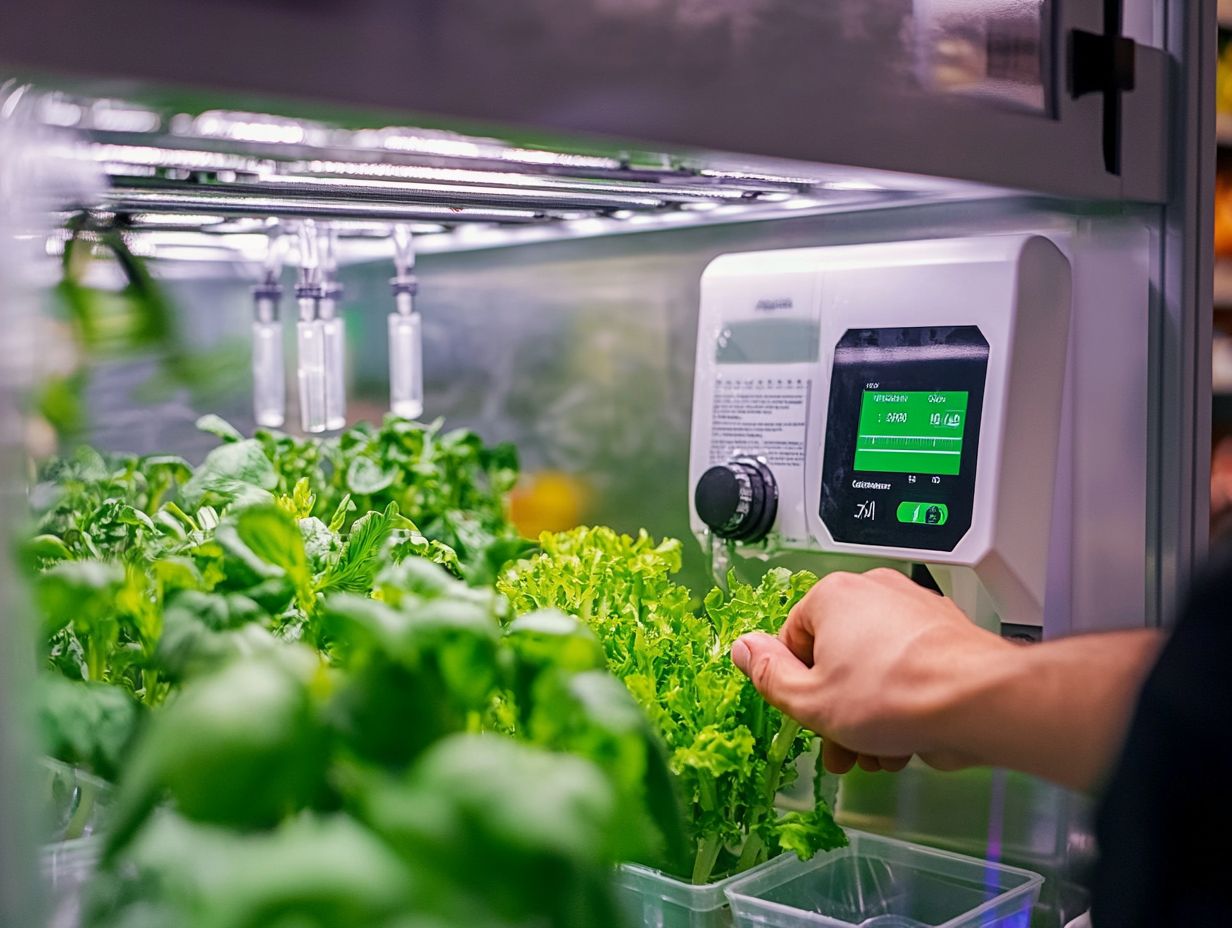
The most common water quality issues in hydroponic systems include:
- Algae growth
- pH imbalance
- Nutrient deficiencies
- Water hardness
- Presence of harmful bacteria or pathogens
How often should the water in a hydroponic system be changed?
Change the water in a hydroponic system every 2-3 weeks. This helps keep your plants thriving by preventing nutrient loss.
What is the best way to maintain proper pH levels in a hydroponic system?
Test the pH levels regularly with a pH meter. Use pH up or down solutions to keep it balanced.
How can I prevent algae growth in my hydroponic system?
Keep your hydroponic system clean to avoid algae. Use UV sterilizers or beneficial microorganisms to outcompete algae for nutrients.
What are the benefits of using reverse osmosis water in a hydroponic system?
Using reverse osmosis water gives you a clean base for your nutrients. This helps avoid nutrient deficiencies and improves water quality.
